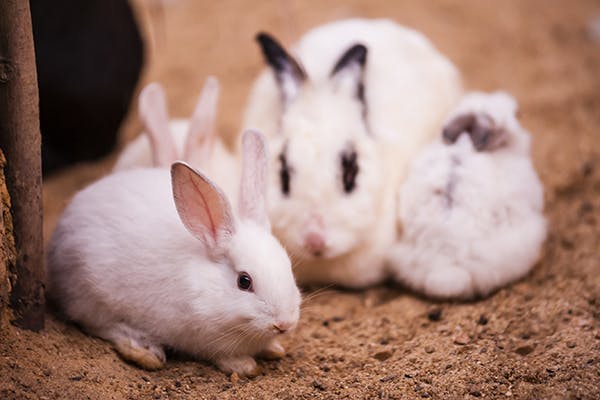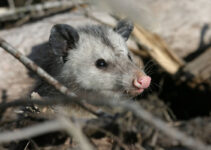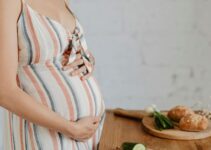The breeding of rabbits is very easy and it could be done at any time of the year. This is simply because the gestational period for rabbits is very short and the litters are usually quite numerous. This animal species has a rather peculiar gestation that has made it a pest in many countries due to its high reproduction rates, which have quickly gotten out of control.
Rabbit Reproduction and Estrus Cycle
The sexual maturity of rabbits varies and depends on both the breed and the sex of the rabbit. But as a general rule, they are all capable of reproducing before they reach 1 year of age. Some rabbit breeds can begin to reproduce early at 4 or 5 months, although the vast majority of giant breeds do not reach full sexual maturity until 9 months of age. In any of the breeds, the females take less time to be physically ready to reproduce than males.
After 4 or 5 years of life, the rabbit becomes too old, so it is not recommended to continue to breed them. In order to avoid unwanted pregnancy, you can choose to castrate and sterilize the animal.
Estrus in rabbits differs considerably from other mammals. They do not have specific periods that they come into heat but are reproductive throughout the year, thanks to induced ovulation (the eggs are released in response to copulation). Despite this, they have a preference for a warm climate to have their young, especially when they are in their natural habitats. Immediately after giving birth, they are ready to reproduce again.
Rabbit Gestation Period
How Long are Rabbits Pregnant
The gestation period in rabbits is 29 to 33 days from the first day of mating. Rabbits have an average gestation period of 31 days. The gestation period in rabbits is very short ant it is considered one of the shortest in the entire animal kingdom. If the due date is exceeded and the rabbit has not given birth, it is most likely that something is wrong such as a wrong mating date was recorded or there was no pregnancy in the first place. If this is not the case, a veterinarian should be contacted quickly to induce labor or the offspring will not survive.
☛ Check This Out: Rabbit Gestation Calculator and Chart
Rabbit Pregnancy
The diagnostic method that confirms the pregnancy status of the pregnant female is palpation. The pregnancy cannot be confirmed until 20 days after mating. This is because before that time the embryos are not detectable by touch. This time should not be exceeded either because there is a risk of causing an abortion if the pregnancy diagnosis is not properly carried out.

Signs of Pregnancy in Rabbits
Symptoms of pregnancy of rabbits can also help confirm their status, although there are some that do not show any signs until minutes before the kits are born.
The signs and symptoms shown by pregnant rabbits include:
- Disinterest in bucks. The first sign that a rabbit may be pregnant is when she disallows the buck (the male rabbit) to mount or mate with her. Note that some female rabbits will reject the advance of a male rabbit right from the start. If this is the case, then a doe’s rejection of a buck is not necessarily a sign that she is pregnant.
- Building of a nest. When a doe starts building a nest, it is apparent that she is pregnant. A pregnant rabbit will start to gather shred papers and hay to build her nest. The nesting process is a natural instinct for all mother rabbits, including the first time mothers.
- Pulling out of the furs. When you notice that a doe is pulling out her furs, you can be quite sure that is the doe is pregnant and even closer to her due date.
- Easily irritated and aggressiveness. Some pregnant bunnies become a bit defensive, irritated and aggressive, even to their owner when they are about to be stroked or touched.
- Increase in weight. This is another typical marker of being pregnant, especially when there is no change in diet.
- Bulging and multiple lumps in the abdomen. This can be observed through palpation of the abdomen. While palpating, maximum care must be taken in order not to harm the growing fetus.
Rabbit Pregnancy Care
The preparation of the nest is usually carried out by the pregnant doe. She will look for all kinds of things that help her with this purpose, such as straw, paper, rags, towels or socks. In addition, the fur pulled from her body makes the nest warmer. This is essential since the newborn rabbits are not able to regulate their temperature until 7 days of age. A rabbit owner can also choose to purchase a premade rabbit nest from a specialized pet store, but there is a high chance that the pregnant female will not accept it.
The feeding of the pregnant doe during this period is essential, so it must be reinforced. Poor nutrition can lead to miscarriage or reabsorption of the embryos by the body. The ideal is a diet of alfalfa hay, complemented with vegetables such as tomato, carrot, lettuce and parsley. Likewise, a good supply of clean water should not be lacking throughout the gestation period of rabbits and postpartum.
Another care that must be taken into account during pregnancy is manipulation. The best thing to do is avoid catching the doe, but if necessary, the handler should hold it gently and carefully so as not to press too hard on the embryos and cause an abortion. Also, there should be no change of routine, as this is something that will make the pregnant doe feel safe and calm. Yes, rabbits love to have a routine.
Psychological pregnancy is also quite common in rabbits. When it occurs, they behave as if they are pregnant and show the symptoms related above, but it is all due to hormonal fluctuations in their body. In these cases, it is not necessary to do anything, just wait for that phase to pass.
Rabbit Kindling
Kindling is the process of giving birth to kits in rabbits. The most important thing to know to prepare for the birth of the kids is that the future mother needs not be disturbed so as not to get stressed. Ideally, a low-light environment without external noise and a stable temperature should be provided. She should not be overwhelmed with human presence; instinctively, she will know what to do. The role of the owner or handler is simply to watch over her to ensure that there are no complications during delivery.
Some signs showed by a pregnant rabbit going into labor soon include:
- Swollen and loose vul.va
- Swollen and full nipples
- Drifts to the nest box
- Restlessness or become unsettled
- Rejection of food
- Pulling out of the abdominal and chest fur
- Uterine contraction
The birth of all the rabbit young is usually quite fast, although there are kindling that extend and can last up to two days. Newborn bunnies are called kids, and they are born hairless and completely blind.
It is worth mentioning that rabbits can devour their young after birth. Under normal conditions, this should not happen, but if the mother feels in danger or becomes nervous for some reason she can act in this way. Hence the importance of giving her space during delivery. Another reason that can drive her to cannibalism is the intense thirst they feel after the young are born, so a generous amount of water must be supplied immediately. If this happens repeatedly and is not due to the causes mentioned above, then it is most likely that the rabbit is not suitable to be a mother.
Litter Size in Rabbits
Rabbits can have between 4 and 12 kids in each litter. As they can have several litters in the year, the number of kids can rise up to 80 in this time, an impressive enough quantity for its small size. Despite the high reproduction rate of rabbits, they can suffer numerous miscarriages due to stressful situations in pregnancy, which limits their offspring.
Postpartum
Once the doe has given birth to her young, the buck should not be allowed to approach or go near her or the newborn rabbits. This is because it is possible that the rabbit will be fertilized immediately after giving birth, but if this happens it will be impossible for her to nurse the rabbits during the entire lactation period. Ideally, wait at least 40 days for the next breeding with a buck.
The mother rabbit will start taking care of her litter and feeding her milk a few minutes after birth. The usual thing is that she visits them twice a day to suckle them—generally, early in the morning and late at night. Breast milk will be the exclusive food of the rabbits until approximately the 18th day, after then the kids can be fed with special feed and hay. Vegetables should not be given to the baby rabbits until they are at least 3 months old.



